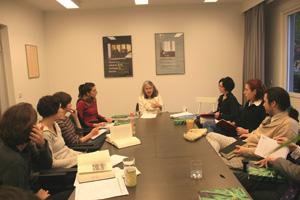
The present PY core course is structured around the theme of objectivity, aiming beyond its scientific boundaries, and revealing its conceptual and practical impact in domains such as ethics, politics, or aesthetics. The beginning of the term was marked by a thorough questioning into the nature and prerequisites of the scientific self, and of objectivity per se. In the light of this task, a great deal of attention was granted to the newly published work of Lorraine Daston and Peter Galison, titled “Objectivity”. The authors identify the main concern of their research as “the creation of a new epistemic virtue-scientific objectivity-that drove scientists to rewrite and re-imagine the guides that divide nature into its fundamental objects…the search for that new form of unprejudiced, unthinking, blind sight we call scientific objectivity.”
The visit of science historian Lorraine Daston, the co-author of “Objectivity” gave the students in the PY core course an opportunity to inquire into the arguments unfolded in it. She offered an insightful exposition of the issues which prompted the research and the methods employed, and drew the guidelines for a better comprehension of the concept’s history and transformations. She acknowledged the present over-emphasis on objectivity in an increasing number of domains, but stressed the fact that it was philosophy to contemplate objectivity first, and only later natural sciences started to adhere to it, with the growth of the scientific community in mid-nineteenth century. Legal, political and social studies have adopted it from the latter, to the purpose of enhancing their authority. The work of Daston and Galison wants to take the concept out of the present debate which is asking questions such as “Is it attainable?” or “Is it good?” and understand its actual meaning, by bringing together all the historical instances of the concept.
“Objectivity is younger than truth or certainty”, claim the authors and embark to tell its story through the pictures in the long tradition of scientific atlases. The reason for this particular focus is threefold: atlases make an account of scientific practice as well as precept, they have been central to scientific practice, appearing since the sixteenth century, and are epistemologically durable, setting the standards for depiction and analysis of phenomena. Moreover, “Objectivity” represents an account of how three epistemic virtues have impacted on the scientific conscience. Their careers succeed one another and are historically determined, which might render them obsolete in the sequence: truth-to-nature, objectivity, trained judgment. It is Kant who opened the modern door for objectivity, but employed it in a different meaning than what we naturally would concur today. He constructed objective relational categories (time, space, causality) whereas today we tend to attribute to objectivity virtues relating more to the subject: detachment, impartiality, disinterestedness, even self-effacement. One of the topics discussed was the figure of the scientist as a hero renouncing all natural temptations in the pursuit of truth. Is there reason to believe that these values are still present?
Lorraine Daston is the director of the Max Planck Institute for the History of Science, where she is currently engaged in the study of history of objectivity, as well as a professor in the Committee on Social Thought at the University of Chicago. She received her doctoral degree in Philosophy from Harvard in 1979, and has held the position of Associate Professor at Harvard, Princeton and Brandeis; in 1990, she became a Professor first at Göttingen University , and later at University of Chicago , and presently is a Honorary Professor at Humboldt-Universität zu Berlin . The Relation Between Natural and Human Sciences, the History of Scientific Objects, and the Ideals and Practices of Rationality are among projects she is currently coordinating within the Institute. She published extensively, being the author and co-author of numerous works: Classical Probability and the Enlightenment (Princeton University Press, 1988) Wonders and the Order of Nature, 1150 – 1750 (MIT Press, 1998), Eine kurze Geschichte der wissenschaftlichen Aufmerksamkeit (2001), Wunder, Beweise und Tatsachen: zur Geschichte der Rationalität (2001), and Objectivity (Boston : Zone Books, 2007). She is also an established editor in her research field.
By Brindusa Birhala (’09, Romania)
